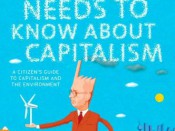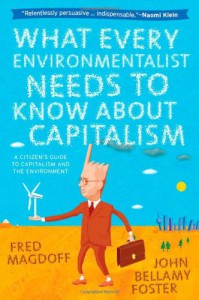Reviews:
The authors carefully develop a powerful case that the normal state of ‘really existing capitalist economies,’ increasingly dominated by multinational megacorporations along with associated financialization, is not growth with occasional recession, but rather stagnation with occasional escapes that have diminishing prospects. Hence an ‘endless crisis,’ endless in both time and space, including China. And a crisis that is heading towards disaster unless there is a radical change of course. This valuable inquiry should be carefully studied and pondered, and should be taken as an incentive to action.
—Noam Chomsky
In the distinguished tradition of Paul Baran and Paul Sweezy, Foster and McChesney here combine grim analysis with bleak prognosis, reminding us that monopoly power disappeared from the textbooks but not from real life. This is a useful book for anyone raised on the reflexive American optimism of the post-war years.
—James K. Galbraith, author, Inequality and Instability: A Study of the World Economy Just Before the Great Crisis
The Endless Crisis provides a compelling discussion of the central economic reality of our time: that the Wall Street collapse and Great Recession of 2007-09 was a human calamity whose effects are ongoing. Foster and McChesney explore the underlying causes of the crisis as a result of the normal operations of capitalism in its contemporary neoliberal variant. Their discussions on financialization, monopoly power, imperialism, and other topics all provide opportunities for us to think more clearly about what is wrong with the societies we live in and how to advance a transformative political project in behalf of equality and social justice.
—Robert Pollin, Professor of Economics and Co-Director, Political Economy Research Institute, University of Massachusetts-Amherst
The Endless Crisis goes beyond being thought-provoking, well-written, and interesting. In many respects it is chilling in its analysis of the evolution of global capitalism and the contours of the global class struggle. This book constitutes a polemic not only with neo-liberal theory but with those who believe that tinkering with the worst aspects of capitalism will resolve the crisis. Foster and McChesney take the reader into the world of the global monopolies and the plutocracies that they have spawned. When you finish this book you cannot but ask the question: ‘When do we get serious about a strategy for the Left to respond to the system of modern day robber-barons that Foster and McChesney so well analyze?’
—Bill Fletcher, Jr., BlackCommentator.com; author of Solidarity Divided and ‘They’re Bankrupting us’ And Twenty Other Myths about Unions
The most important book yet to appear on stagnation, the central problem of modern economic reality. Essential reading for serious liberal, heterodox, radical, and all open-minded economic thinkers.
—Gar Alperovitz, author, America Beyond Capitalism; Lionel R. Bauman Professor of Political Economy, University of Maryland
John Bellamy Foster and Robert McChesney’s The Endless Crisis very effectively integrates analysis of the development, character, and impact of monopoly-finance capital, which includes the now global and immense reserve army of labor, and with stagnation tendencies harder and harder to overcome. They also demonstrate well the urgency of working class organization on a global basis.
—Edward S. Herman, professor emeritus of finance, the Wharton School, University of Pennsylvania
This is a most remarkable and important book. It is political economy at its best. It offers a sophisticated explanation of the socio-economic crisis facing the global and domestic economies. The authors further argue that the socio-economic crisis cannot be resolved without a total transformation away from the oligopolistic capitalistic system. The work of Foster and McChesney can be embraced by all heterodox political economy traditions.
—Hans G. Despain, Marx & Philosophy Review of Books
A focused and muscular work that ranks alongside the works of John Kenneth Galbraith, Paul Sweezy, Paul Baran and other great political economists who were unafraid to deliver sobering criticisms of modern capitalism. It is a robustly researched testament to the enduring relevance of Marxist theory in the 21st century.
—Philip Louro, New Politics
The Marxist perspective, exemplified in a new book by John Bellamy Foster and Robert McChesney, is also useful. This argues that the strong western growth rates in the middle of the 20th century were something of a mirage . . . The result has been a declining trend rate of growth, and the increased financialisation of western economies as the surpluses have been re-cycled through the banks in a search for yield. Hence the Latin American debt crisis. Hence the sub-prime mortgage crisis. Hence the inability of the global economy to emerge from its torpor.
—Larry Elliott, the Guardian






